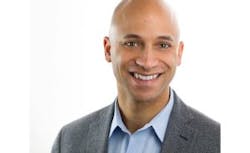PPG’s Jaime Irick: Authentic Approach is Vital to Changing Culture
Sometimes when you are a leader the most important thing you can do is tell things like they are.
And this is exactly the philosophy of Jaime Irick, PPG vice president, architectural coatings, U.S. and Canada.
While manufacturers have been addressing issues of diversity, inclusion and equity for quite some time, current events call for companies to specifically address the issue of systemic racism.
“This is not a moment, it’s a movement,” explains Irick.
In a very personal email, he took that message to his business, which consists of more than 6,000 people. He spoke of his family’s involvement in the civil rights movement in the 60s. And he expressed his disappointment that “after multiple decades, so many parts of our country are still deeply mired in racism.”
Irick called for action. “We can’t afford to stand on the sidelines. As human beings, we have an obligation to take an active role as to what’s going on in our country.”
And using the word racism is key. “I believe strongly in first embracing reality, and then defining what winning looks like,” he said.
To “win” by improving his team’s approach to diversity, equity and inclusion, he does what any good lean leader would do -- Irick worked at General Electric for over a decade where he was a GE company officer -- he determines the current state.
“We have been having frank conversations, up and down the organization,” says Irick. “As a Black executive for about twenty years, I have always had these conversations and now everyone at the company is doing the same. We talk about perceptions and we talk about unconscious bias.”
Discussion is an important first step in an overall attitude change. In his email, he spelled this out. “…as a global company, and as individuals, we can make a difference and amplify this moment into a movement.”
Irick said that many employees have expressed to him how grateful they are to discuss this issue and want to see change happen across corporate America.
Fostering change is nothing new to Irick. While at PPG he has created one of the most diverse teams at the company. “It’s not a coincidence that our team is performing well, as many studies have shown diverse teams outperform non-diverse teams. In fact, in today’s world, if a company wants to compete in the market and provide a fair return to shareholders, they need to be creating diverse teams.”
While evaluating the current state and improving it, Irick has a clear view of the future state as well. “As we hire people out of college, they are going to ask us, ‘what was your response to the George Floyd murder? Did you change your policies? Did you change the makeup of your teams?’”
Irick also sees this issue as being important to customers and suppliers. “There will be more stringent standards in the area of diversity.”
Being held up to stringent standards is something that Irick says PPG is more than capable of. “Continuously improving the company is core to the PPG Way,” Irick says. “We always strive to do better today than we did yesterday and as we approach the issues of racism, discrimination, and bias, we will do the same and continue to take authentic steps to ensure progress.”

